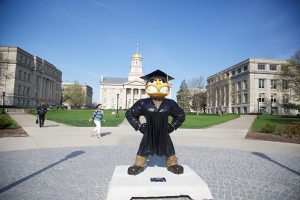Opinion: Gen-ed classes need to be more accessible at the University of Iowa
The material taught in a liberal-arts education should expand the mind of students, not bog them down with major-level content.
The Old Capitol building is seen in 2018.
December 5, 2019
By enrolling in the University of Iowa College of Liberal Arts and Sciences, students agree to take a required amount of general-education credits that satisfy what a liberal-arts education is intended to do: give a well-rounded education of science and humanities to students.
Perhaps the word “science” stopped you dead in your tracks. In order to graduate, you are required to take a quantitative and formal reasoning (or math equivalent) class, and one natural science with a lab and one without a lab. The UI offers several classes that are supposedly made so nonmajors can fulfill the requirement without having to take extremely difficult classes, such as chemistry. However, students often still struggle through these courses, partially because they are unwilling to become interested in that subject, and partially because professors are unwilling to water down the material for them.
Human Origins is a course that is required for anthropology majors and counts as a gen ed for a natural science without a lab. Its foundations are basic biology, primatology, and looking at evolution through the fossil record. As an anthropology major myself, I found the class to be enthralling, but also challenging at times. The exams were 70 questions long, and there were only 50 minutes to complete it. During discussion, the slides on the instructor’s PowerPoints overflowed with information and could often be easily confused with other material.
If instructors watered down their science courses with less material, students with an English background, per se, would be able to conceptualize the detailed information better and wouldn’t feel so overwhelmed when studying for an exam. By doing this, students will also want to participate more in class and perhaps become more interested in the material being gifted to them.
Making one’s course more inclusive toward nonmajors can only make professor’s departments look better, and who knows, maybe a student sitting in a gen-ed class will become inspired to declare that specific subject as their second major.
But that doesn’t mean students are not partially at fault. When registering for classes, many students are guilty of not reading through the course’s description or its syllabus (if it’s available). They enroll in a science class with the presumption that they already won’t enjoy it because of the noted “s” word and they “don’t need it for their major.”
Yes, you may never use the material from Age of Dinosaurs in your life, but you will learn critical-thinking skills and strengthen your understanding of what came before you. Dinosaurs may be long in the past, but in time, you will be too.
From what I’ve gathered, many people enrolled in those types of classes don’t study until the night before the exam. While this technique may do the trick for other classes — believe me, I’ve been there — it seldom works for science-based courses. By studying in advance, you can not only score higher, but you will also learn for life. It’s more than just questions and answers.
It is imperative that liberal-arts students take these classes, but if the material is too difficult to understand, many will never come to appreciate the knowledge that is being handed to them.





